2025年牛津译林版英语中考专题复习课件:九年级(下)Units 1-4(共74张PPT)
文档属性
| 名称 | 2025年牛津译林版英语中考专题复习课件:九年级(下)Units 1-4(共74张PPT) |

|
|
| 格式 | pptx | ||
| 文件大小 | 1.6MB | ||
| 资源类型 | 教案 | ||
| 版本资源 | 牛津译林版 | ||
| 科目 | 英语 | ||
| 更新时间 | 2025-03-10 21:37:23 | ||
图片预览

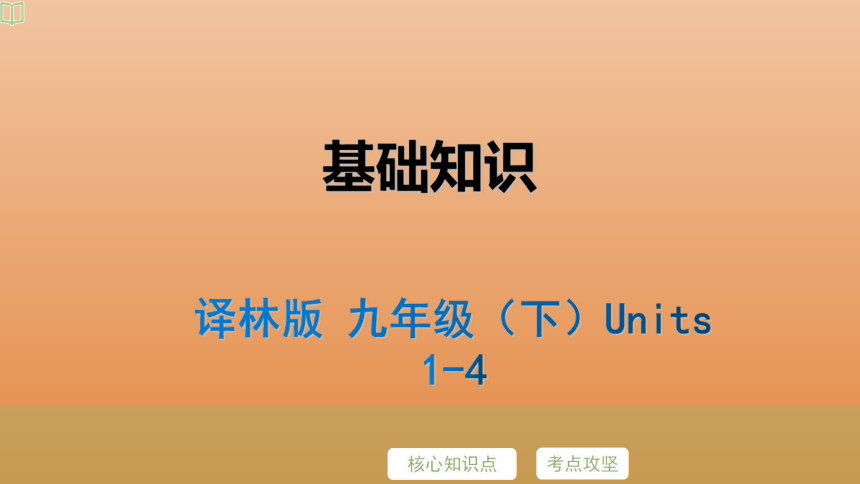

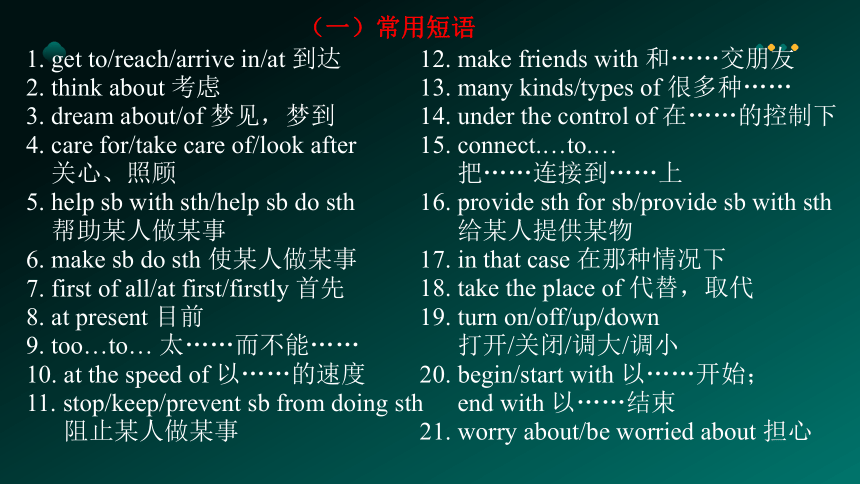
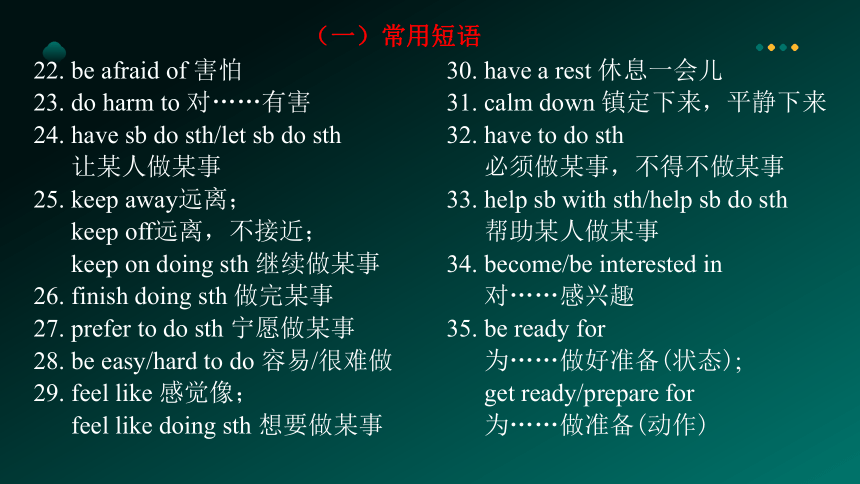
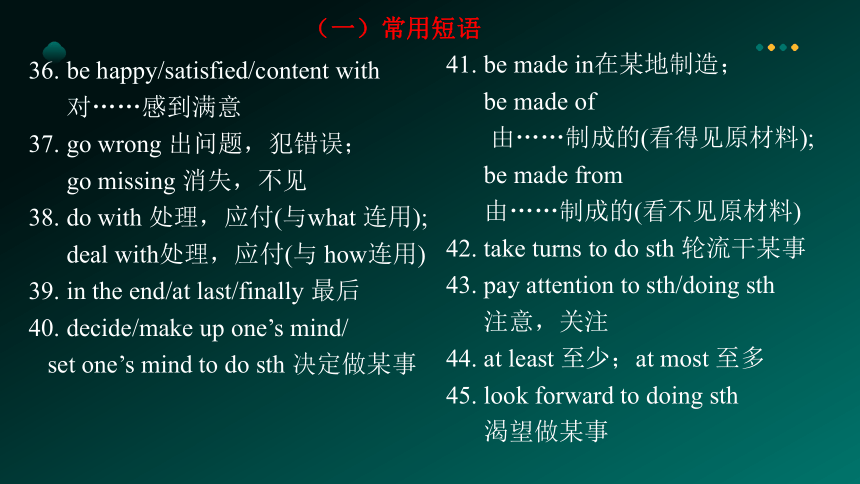
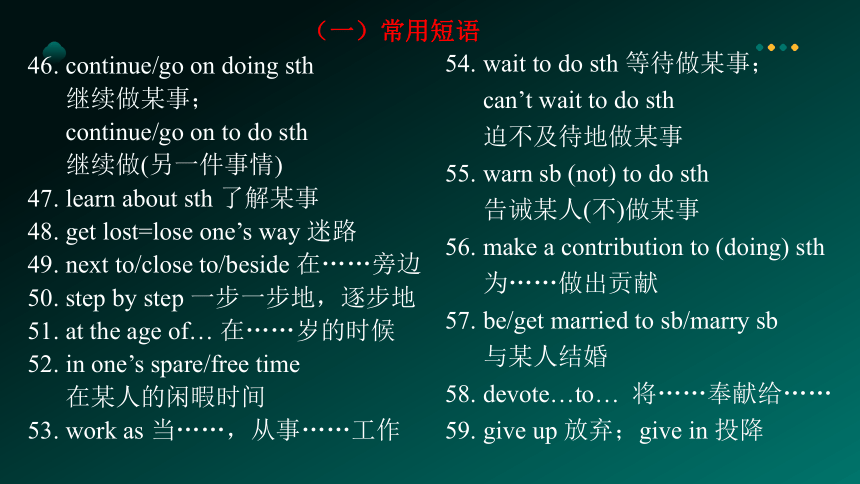
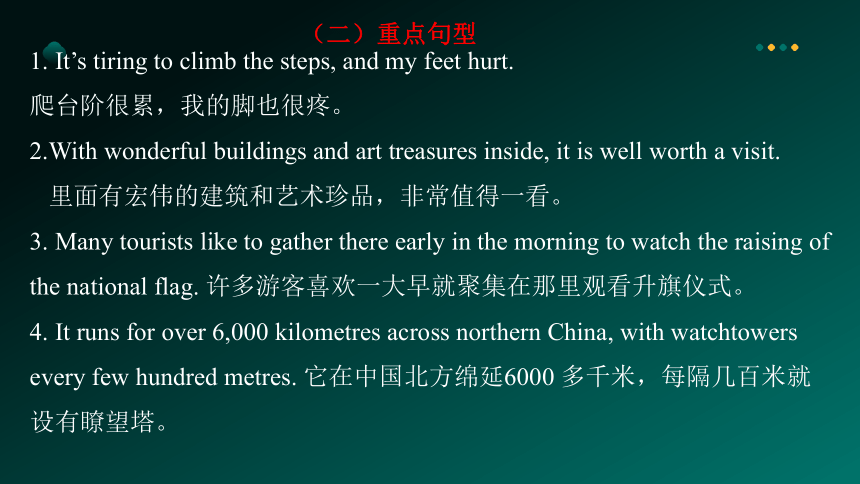
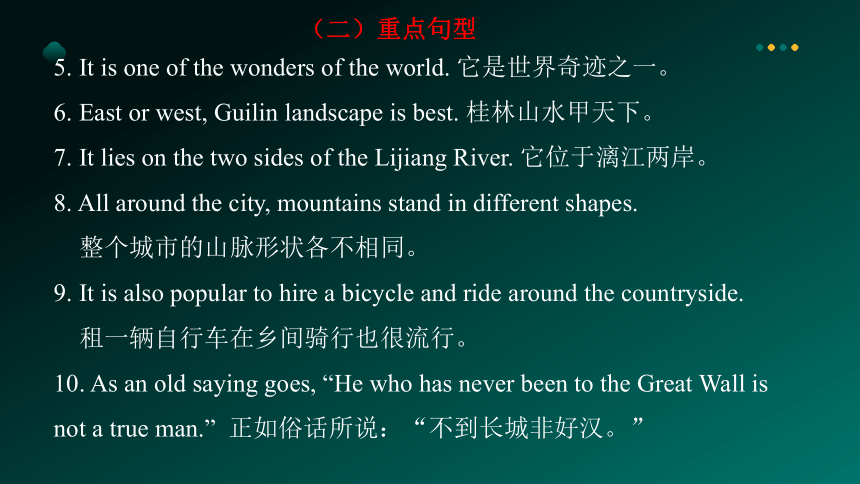
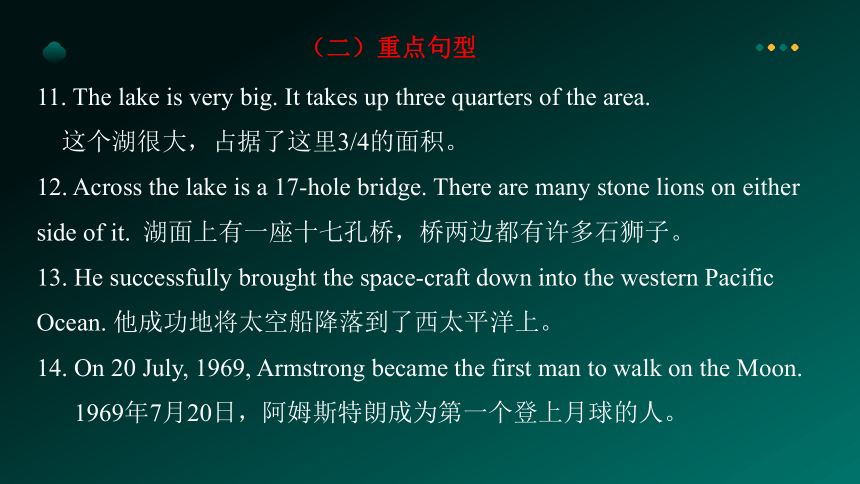
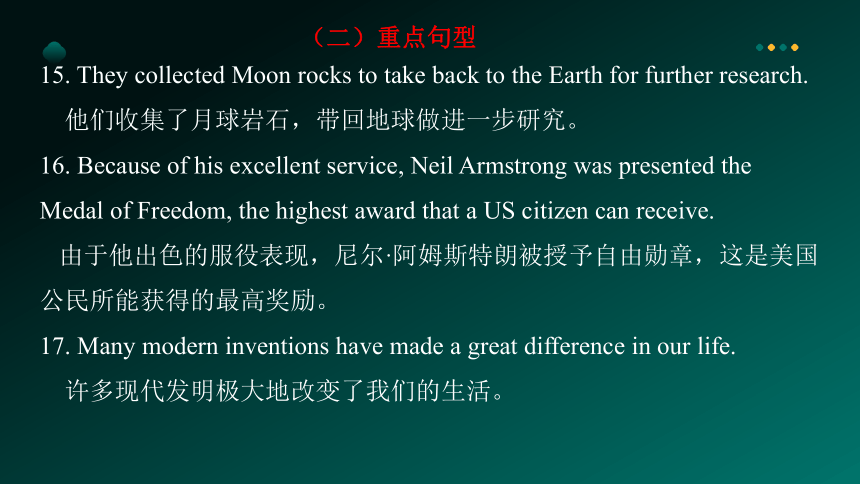
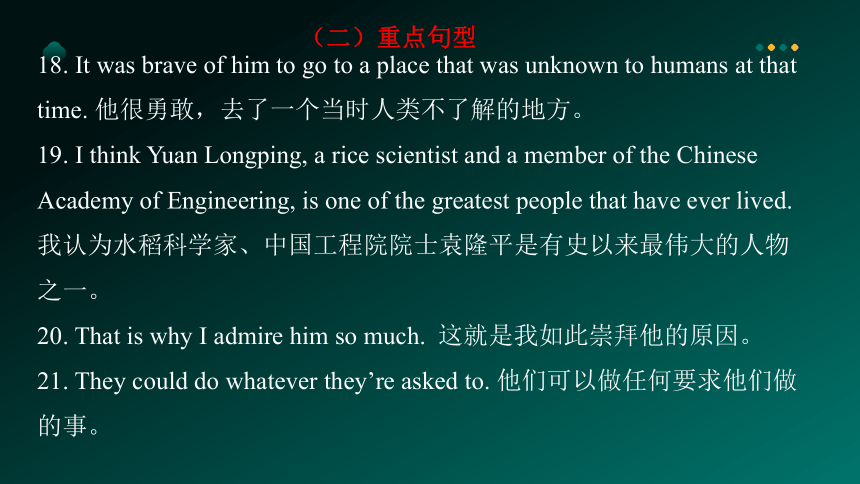
文档简介
(共74张PPT)
2025年英语中考复习
基础知识
译林版 九年级(下)Units 1-4
核心知识点
贰
(一)常用短语
1. get to/reach/arrive in/at 到达
2. think about 考虑
3. dream about/of 梦见,梦到
4. care for/take care of/look after
关心、照顾
5. help sb with sth/help sb do sth
帮助某人做某事
6. make sb do sth 使某人做某事
7. first of all/at first/firstly 首先
8. at present 目前
9. too…to… 太……而不能……
10. at the speed of 以……的速度
11. stop/keep/prevent sb from doing sth
阻止某人做某事
12. make friends with 和……交朋友
13. many kinds/types of 很多种……
14. under the control of 在……的控制下
15. connect.…to.…
把……连接到……上
16. provide sth for sb/provide sb with sth
给某人提供某物
17. in that case 在那种情况下
18. take the place of 代替,取代
19. turn on/off/up/down
打开/关闭/调大/调小
20. begin/start with 以……开始;
end with 以……结束
21. worry about/be worried about 担心
(一)常用短语
22. be afraid of 害怕
23. do harm to 对……有害
24. have sb do sth/let sb do sth
让某人做某事
25. keep away远离;
keep off远离,不接近;
keep on doing sth 继续做某事
26. finish doing sth 做完某事
27. prefer to do sth 宁愿做某事
28. be easy/hard to do 容易/很难做
29. feel like 感觉像;
feel like doing sth 想要做某事
30. have a rest 休息一会儿
31. calm down 镇定下来,平静下来
32. have to do sth
必须做某事,不得不做某事
33. help sb with sth/help sb do sth
帮助某人做某事
34. become/be interested in
对……感兴趣
35. be ready for
为……做好准备(状态);
get ready/prepare for
为……做准备(动作)
(一)常用短语
36. be happy/satisfied/content with
对……感到满意
37. go wrong 出问题,犯错误;
go missing 消失,不见
38. do with 处理,应付(与what 连用);
deal with处理,应付(与 how连用)
39. in the end/at last/finally 最后
40. decide/make up one’s mind/
set one’s mind to do sth 决定做某事
41. be made in在某地制造;
be made of
由……制成的(看得见原材料);
be made from
由……制成的(看不见原材料)
42. take turns to do sth 轮流干某事
43. pay attention to sth/doing sth
注意,关注
44. at least 至少;at most 至多
45. look forward to doing sth
渴望做某事
(一)常用短语
46. continue/go on doing sth
继续做某事;
continue/go on to do sth
继续做(另一件事情)
47. learn about sth 了解某事
48. get lost=lose one’s way 迷路
49. next to/close to/beside 在……旁边
50. step by step 一步一步地,逐步地
51. at the age of… 在……岁的时候
52. in one’s spare/free time
在某人的闲暇时间
53. work as 当……,从事……工作
54. wait to do sth 等待做某事;
can’t wait to do sth
迫不及待地做某事
55. warn sb (not) to do sth
告诫某人(不)做某事
56. make a contribution to (doing) sth
为……做出贡献
57. be/get married to sb/marry sb
与某人结婚
58. devote…to… 将……奉献给……
59. give up 放弃;give in 投降
(二)重点句型
1. It’s tiring to climb the steps, and my feet hurt.
爬台阶很累,我的脚也很疼。
2.With wonderful buildings and art treasures inside, it is well worth a visit.
里面有宏伟的建筑和艺术珍品,非常值得一看。
3. Many tourists like to gather there early in the morning to watch the raising of
the national flag. 许多游客喜欢一大早就聚集在那里观看升旗仪式。
4. It runs for over 6,000 kilometres across northern China, with watchtowers every few hundred metres. 它在中国北方绵延6000 多千米,每隔几百米就设有瞭望塔。
5. It is one of the wonders of the world. 它是世界奇迹之一。
6. East or west, Guilin landscape is best. 桂林山水甲天下。
7. It lies on the two sides of the Lijiang River. 它位于漓江两岸。
8. All around the city, mountains stand in different shapes.
整个城市的山脉形状各不相同。
9. It is also popular to hire a bicycle and ride around the countryside.
租一辆自行车在乡间骑行也很流行。
10. As an old saying goes, “He who has never been to the Great Wall is not a true man.” 正如俗话所说:“不到长城非好汉。”
(二)重点句型
11. The lake is very big. It takes up three quarters of the area.
这个湖很大,占据了这里3/4的面积。
12. Across the lake is a 17-hole bridge. There are many stone lions on either side of it. 湖面上有一座十七孔桥,桥两边都有许多石狮子。
13. He successfully brought the space-craft down into the western Pacific Ocean. 他成功地将太空船降落到了西太平洋上。
14. On 20 July, 1969, Armstrong became the first man to walk on the Moon.
1969年7月20日,阿姆斯特朗成为第一个登上月球的人。
(二)重点句型
15. They collected Moon rocks to take back to the Earth for further research.
他们收集了月球岩石,带回地球做进一步研究。
16. Because of his excellent service, Neil Armstrong was presented the Medal of Freedom, the highest award that a US citizen can receive.
由于他出色的服役表现,尼尔·阿姆斯特朗被授予自由勋章,这是美国公民所能获得的最高奖励。
17. Many modern inventions have made a great difference in our life.
许多现代发明极大地改变了我们的生活。
(二)重点句型
18. It was brave of him to go to a place that was unknown to humans at that time. 他很勇敢,去了一个当时人类不了解的地方。
19. I think Yuan Longping, a rice scientist and a member of the Chinese Academy of Engineering, is one of the greatest people that have ever lived.
我认为水稻科学家、中国工程院院士袁隆平是有史以来最伟大的人物之一。
20. That is why I admire him so much. 这就是我如此崇拜他的原因。
21. They could do whatever they’re asked to. 他们可以做任何要求他们做的事。
(二)重点句型
(二)重点句型
22. The robot made Mr Jiang’s life much easier.
机器人让江先生的生活轻松多了。
23. When Mr Jiang returned home from work, his flat would look as good as new.
当江先生下班回家时,他的公寓看起来就像新的一样了。
24. It seemed that in general the robot satisfied Mr Jiang’s needs.
看来这个机器 人基本上满足了江先生的需要。
25. It can read a book in 5 minutes and tell you about it in clear language.
它可以在5分钟内读完一本书,并用清晰的语言讲给你。
26. I regret having bought a robot like this. 我后悔买了这样一个机器人。
27. It is hoped that people could start all over again and build a better world on Mars. 希望人类可以重新开始,在火星上建造一个更美好的世界。
28. With the development of technology, by the year 2100, the journey might only take about 20 minutes in spacecraft that travel at the speed of light.
随着科技的发展,到2100年,乘坐以光速飞行的宇宙飞船,这段旅程可能只需要20分钟。
29. The gravity on Mars is only about three-eighths of that on the Earth.
火星的引力只有地球的3/8。
(二)重点句型
(二)重点句型
30. People would have to wear boots that are specially designed to prevent themselves from floating off into space.
人们不得不穿着专门设计的靴子,以防止自己飘向太空。
31. Every student would have a computer at home connected to an interplanetary network. 每个学生家里都会有一台连接到星际网络的电脑。
32. Life on Mars would be interesting as well as challenging.
火星上的生活既有趣又充满挑战。
33. Are you aware of the distance between Mars and the Sun
你知道火星和太阳的距离吗
34. Mars is a planet that has an environment similar to that of the Earth.
火星是一颗环境与地球相似的行星。
(二)重点句型
(三)核心知识点聚焦
1. How do you like… /What do you think of… 的用法辨析
what do you think of… 询问对某事物的看法或评价。例如:
What do you think of this movie 你觉得这部电影怎么样
how do you like… 询问对某事物的喜好或满意程度。例如:
How do you like this song 你喜欢这首歌吗
2.It is+形容词 +to do sth做某事是……。例如:
It is hard for me to learn English well.
对于我来说,学好英语真是太难的了。
( 可以理解成:To learn English is hard.)
【注意】此句型中,“for me”表示“对于某人来说”。be后面一定是描写事物性质的形容词。
(三)核心知识点聚焦
3. 比较级+and+比较级,意为“越来越……”,and连接同一个形容词的比较级。例如:
It becomes warmer and warmer when spring comes.
春天来了,天气变得越来越暖和了。
4. It takes sb some time to do sth/sb spend some time on sth/(in) doing sth
花费某人多少时间。例如:
It took me half an hour to do the work.
=I spent half an hour in doing the work.
我花了半个小时的时间做这项工作。
【注意】
(1)cost和pay只指花费钱,take只指花费时间,spend既可以指花费钱也可以指花费时间。
(2)spend和pay主语都是人,cost主语是物,take一般用于It takes sb sometime to do sth.句型中。
(三)核心知识点聚焦
5. amazing、amazed的用法辨析
(1)amazing意为“令人惊讶的”,含主动意义,修饰物。如果有些事情发生得出乎意料,难以置信,可以用amazing来形容。例如:
It’s just an amazing journey. 这是一个奇妙的旅程。
(2)amazed意为“(某人)感到惊奇的”,含被动意义,修饰人。常见词组:be amazed by/at意为“对……感到惊奇”。例如:
We are all amazed at the amazing views here.
我们都对这里令人惊奇的风景感到惊讶。
(三)核心知识点聚焦
6. tiring、tired的用法辨析
tiring意为“使人疲劳的”,表示主动意义,一般用来修饰事物,表示事物的性质或特征。例如:
It’s very tiring work. 这是很累人的工作。
tired意为“感到疲劳的”,表示被动意义,主语一般是表示人的名词或代词,常构成系表结构。固定搭配:
be tired with… 因……而疲劳
be tired of… 对……感到厌烦
类似的形容词有:amazing/amazed; exciting/excited;
boring/bored; interesting/interested
(三)核心知识点聚焦
7. I’m taking a rest.
这句话意为“我要休息一下”,是用现在进行时表示即将进行的动作,即说话之前已经计划好的事情。英语中,一些表示位置移动的动词(如: go、come、leave、 stay、arrive、 fly、start、begin、plan、move、walk、ride、drive、take等 ) 通常用现在进行时来表示已经计划好的、将要发生或即将发生的动作。例如:
The Blacks are leaving for Beijing. 布莱克一家要动身去北京。
I hear you are driving to Suzhou for your holiday.
我听说你要驾车去苏州度假。
(三)核心知识点聚焦
8. still
(1)still adv.仍然,仍旧,还是。
例如:There’s still time to change your mind. 还有时间改变你的想法。
(2)still adj. 静止的,平静的,寂静
的。例如:
Keep still while I comb your hair. 我 给你梳头时你不要动。
(3)still v. 静止,平静,安静。
例如:The wind stilled. 风停了。
【注意】still用于肯定句中,而yet用于否定句和疑问句中。例如:
He is still a child. 他还是个孩子。
He is not yet an adult. 他尚未成年。
(三)核心知识点聚焦
9. had better
意为“最好”,常用来表示对别人的建议、劝告或表达一种愿望。had better后接 动词原形,其否定式为had better not do sth,意为“最好不要做某事”。had better可与前面的代词缩写为’d better。例如:
You’d better go to school at once. 你最好立即去上学。
We’d better keep moving. 我们最好继续前进。
(三)核心知识点聚焦
10. keep doing sth
意为“继续做某事,一直做某事”,相当于keep on doing sth。例如:
He kept (on) coughing last night. 他昨晚一直在咳嗽。
固定搭配:
keep busy 保持忙碌; keep healthy/fit 保持健康;
keep together 待在一起; keep safe 保证安全;
keep up with 跟上……;
keep off 使 …… 避开,不接近;
keep out (of) 关在外面,不让……进入;
keep sb from doing sth 阻止某人做某事;
keep sb/sth doing sth 使某人/某物一直做某事;
keep sb/sth done 使某人/某事被……
keep sb/sth+adj. 保持某人/某物……
(三)核心知识点聚焦
11. wake up
意为“叫醒,唤醒,醒来”,是“动词+副词”型短语。当宾语是名词时,宾语放在up前后均可,但当宾语是副词时,宾语只能放在wake和up之间。例如:
Please wake Tom up at 7 o’clock.=Please wake up Tom at 7 o’clock.
请在7点钟叫醒汤姆。
Your dad is sleeping. Don’t wake him up. 你的爸爸在睡觉,别叫醒他。
Wake me up on your way back. 在你返回的路上把我叫醒。
【拓展】常见的含up的短语有:
pick up 捡起;give up 放弃;put up 举起,搭建;eat up 吃完,吃光;
look up 向上看,查阅;move up 向上移动;open up 开启,打开;
set up 建立,设立;wash up (饭后)洗餐具;clean up 清理;pull up拔出。
(三)核心知识点聚焦
12. plan
及物动词,意为“计划”。plan to do sth意为“计划做某事”,动词不定式to do sth作动词plan的宾语。例如:
I’m planning to travel around China. 我正在计划游遍中国。
Where do you plan to spend this weekend 你打算在哪里度过这个周末
【拓展】
(1)plan n.计划,打算。常用结构:make a plan 制订计划。例如:
We should make a plan for our study. 我们应该为学习制订一个计划。
(2)常接动词不定式作宾语的动词还有:ask、like、love、want、decide、hope、wish、need、help、remember、forget、try、expect、begin、agree、offer、refuse、would like等。例如:
I don’t like to be late for school. 我不喜欢上学迟到。
We all want to have a try. 我们都想试一试。
(三)核心知识点聚焦
13. used to do sth
意为“过去常常做某事”,通常指过去的习惯动作。例如:
My grandparents used to walk after supper.
我的爷爷奶奶过去经常在晚饭后散步。
【辨析】used to do sth、be used to do sth、be used to doing sth
I used to get up late, but now I’m used to getting up early every day.
我过去常常晚起,但现在我习惯于每天早起。
Computers can be used to play games.
=Computers can be used for playing games. 电脑可以用来玩游戏。
used to do sth 意为“过去常常做某事”,指过 去经常做而现在不做了,是一般过去时
be used to do sth 意为“被用来做某事”,相当于be used for doing sth,是被动结构
be used to doing sth 意为“习惯于做某事”,可用于任何时态,其中的to是介词,后接名词或动词-ing形式
(三)核心知识点聚焦
14. turn…into…相当于change…into…,意为“把……变成……”。例如:
Ice can be turned/changed into water. 冰可以变成水。
【拓展】含turn的短语还有:
turn on 打开;turn off 关掉;turn up 开大;turn down 把……关小;
turn to 转到,把……转向;turn left/right 向左/右转;turn over 翻转;
turn around 转向,转过去;turn in 上交;take one’s turn 轮流;
by turns 轮流地。
(三)核心知识点聚焦
15. worth
意为“有……价值,值……钱”,其后可接名词,但在接动词时,应用该动词的-ing形式或该动词不定式的被动形式,即be worth doing sth或be worth to be done,意为“……值得做”。例如:
If you answer the question correctly, it’s worth two points.
如果你答对了这道题可以得2分。
The mobile is worth buying/to be bought. 这部手机值得买。
【拓展】
(1)worth是表语形容词,不能放在名词前作定语。表示“很值得……”,应用副词well修饰worth,不可用too、very、quite等副词修饰。例如:The coat is well worth buying. 这件外套很值得买。
(2)be worth后的动词-ing形式常带有含蓄性和泛指性,其前一般不用形容词性物主代词。例如:The book is worth reading. 这本书值得一看。
(3)be worth后的动词如果是不及物动词,其后应加上适当的介词。例如:His speech is well worth listening to. 他的演讲很值得一听。
(三)核心知识点聚焦
16. tourist
意为“旅游者,观光者”。例如:
Suzhou is full of tourists all the year round. 苏州全年到处都是观光者。
【拓展】tour n.旅行,观光,参观;v.旅行,观光,参观;
tourer n.游客,游览车。
【辨析】trip、travel、journey、tour
trip 常指短距离的旅游或往返的旅行
travel 常用于口语中,指到远方去的或长期的旅行
journey 常指远距离的陆地旅游,较为正式。
tour 指周游途中在许多地方做短暂性停留的观光旅游
(三)核心知识点聚焦
I made many new friends during the trip.
这次旅行中我结交了许多新朋友。
Do you still remember the travel in Australia
你还记得澳大利亚之旅吗
They decided to make a journey to the northwest of China.
他们决定到中国西北地区去旅游。
Do you have a morning tour
你们有上午的观光游吗
(三)核心知识点聚焦
17. raising
意为“升高”。例如:
He is watching the raising of the balloon. 他正在观看气球升起。
【拓展】
(1)raise vt.筹集,招募,相当于collect。常用结构:raise…for.…意为“为……筹集……”。例如:
We are raising books and clothes for the students in poor areas.
我们正在为贫困地区的学生筹集书籍和衣物。
I will raise enough money for my holiday. 我会筹够钱去度假。
(2)raise vt.&.vi.举起,抬起,提高;养育,种植。例如:
If you have any question, raise your hand, please.
你如果有任何问题,请举手。
Do you know how people in the southraise rice
你知道南方人如何种植水稻吗
(三)核心知识点聚焦
【辨析】raise和rise
raise 是及物动词,意为“举起,升高,提 高”,主要指借助外力在原有基础上的升高
rise 是不及物动词,意为“升起,上涨”, 主要指凭借自身力量由低到高移动,常用来表示一些自然现象和价格等的上涨
(三)核心知识点聚焦
18. attract和attractive
(1)attract v.吸引(某人的注意力、 兴趣、情感等),引起(兴趣、关注等),使喜爱。后面的宾语可以是人,也可以是物。如果与介词to连用,则表示“把……吸引到……”。例如:
The teacher attracts his students because of his excellent teaching.
这位老师吸引他的学生是因为他出色的教学。
(2)attractive adj.有吸引力的,吸引人的,有魅力的,引人注目的。例如:
She is a very attractive lady.
她是一位非常有魅力的女士。
(三)核心知识点聚焦
19. one of…
意为“……中的一个,……之一”,其中的one可指人,也可指物,介词of后接复数名词或代词;当名词前有形容词修饰时,常用形容词的最高级形式。该短语作主语时,谓语动词应用单数形式。例如:
Yao Ming is one of the best basketball players in China.
在中国,姚明是最好的篮球运动员之一。
One of them is for you, David.
大卫,它们中的一个是给你的。
It is one of the wonders of the world.
它是世界奇观之一。
(三)核心知识点聚焦
20. lie
意为“位于”,相当于be或stand,其过去式是lay,过去分词是lain。例如:
Japan lies to the east of China. 日本位于中国以东。
It lies on the two sides of Lijiang River. 它位于漓江的两岸。
【拓展】
(1)lie vi.认躺,平卧。其现在分词形式是lying,过去式是lay,过去分词是lain。常用结构:lie on…意为“躺在……上面”。例如:
He often lies on bed to read. 他经常躺在床上看书。
(2)lie vt.&.vi.说谎,撒谎。其过去式和过去分词都是lied;lie作名词,意为“谎言,谎话”,tell a lie意为“说谎”。例如:
Lies can’t cover the facts. 谎言掩盖不了事实。
(3)lay vt.放;产(卵),下(蛋)。例如:
The hen lays an egg every day. 这只母鸡每天产一只蛋。
(三)核心知识点聚焦
21. need
实义动词,意为“需要”,有人称和时态的变化,其后可接名词、代词、动词-ing形式或动词不定式等。need to do sth意为“需要做某事”。例如:Kate needs some more water. 凯特需要多喝水。
He needs to get a new pair of trousers. 他需要买一条新裤子。
【拓展】
(1)need作情态动词时,后接动词原形,主要用于否定句和疑问句中,且没有人称和数的变化。例如:
We needn’t hurry. 我们不必着急。
Need he go so soon 他需要这么早就走吗
(2)need作名词时,常与介词of或for连用。例如:
There is no need to thank me. 没有必要谢我。
The doctor said our teacher was in great need of a holiday.
医生说我们的老师需要休假。
There’s a growing need for new houses in this city.
这个城市的住房需求日益增长。
(三)核心知识点聚焦
【辨析】need to do sth和need doing sth
Do you need to do your homework 你需要做作业吗
The bike needs repairing. 这辆自行车需要修理。
need to do sth 主语是动作的执行者,表示主动的动作
need doing sth 主语是动作的承受者,表示被动 的动作,相当于“need to be+过去分词”
(三)核心知识点聚焦
22. 代词it的用法
(1)it作人称代词。可指物,性别不明的人,代替指示代词this、that和复合不定代词something、anything、nothing等。例如:
Who is that over there Maybe it is your friend Jack.
那边的人是谁?也许是你的朋友杰克。
(2)it作非人称代词,可用于指代时间、距离、天气、气候、温度、价值等。例如:
—What’s the weather like today 今天的天气怎么样
—It’s sunny. 今天是晴天。
(3)it作形式主语,常见句型有:It’s adj.+of/for sb to do sth、It takes/took sb some time to do sth、It seems/seemed that+clause 等。例如:
It takes me 20 minutes to go to school by bike every day.
每天我都要花20分钟骑自行车去上学。
(4)it作形式宾语,常见结构:sb find/think/……+it+宾语补足语(adj./……)+to do sth。例如:
I find it difficult to learn English well. 我觉得学好英语是一件很困难的事。
(三)核心知识点聚焦
23. receive
意为“收到,接收”。例如:
I received a lot of cards and presents on my birthday.
在生日那天我收到了很多贺卡和礼物。
receive与accept的区别:receive只表示被动地收到,但不一定接受; accept常表示主动接受。例如:
She has received his present, but she will not accept it.
她收到了他的礼物,但她不会接受他的礼物。
24. join
短暂性动词,不能跟一段时间状语连用,如果后接一段时间状语,则可用be in/be a member of…。例如:
He joined the army two years ago. He was in the army for two years.
He was a member of the army for two years. 他两年前入伍了。
(三)核心知识点聚焦
25. manage to do sth
意为“设法做某事”例如:
I managed to get there, but the show had been over.
我好不容易赶到那里,但演出已经结束了。
【辨析】mange to do sth与try to do sth
manage to do sth设法做成某事,强调结果,成功完成。try to do sth力做某事,强调动作,不知道此事能否做成。例如:
How could he manage to get away from the prison
他怎么设法从监狱里逃走的呢
26. on one’s way to…
意为“在某人去……路上”,当后接表示地点的副词时,要省去to。例如:
When I saw them, they were on their way to the cinema.
当我看到他们的时候,他们正在去电影院的路上。
Don’t worry. They are on their way there.
不用担心,他们正在去那儿的路上。
(三)核心知识点聚焦
27. control
out of control失去控制,无法管理。例如:
The machine was out of control. 那台机器失去控制了。
其他常见的词组:beyond control难以控制;under control被控制的
28. cut…short 意为“缩短”
He cut short his holiday to deal with the problem.
为了解决这个问题,他缩短了他的假期。
常见词组:cut down 砍倒,削减;cut in 插嘴,插队;
cut off 切断,隔断;cut out 剪去,关掉。
(三)核心知识点聚焦
29. together
(1)together with意为“与……一起,连同”,在句中的位置比较灵活,可以放在句首、句中、句尾或主语后,但谓语动词的单复数形式要与主语保持一致。例如:
The teacher together with some students is visiting the factory.
老师与一些学生正在一起参观工厂。
I have some problems working together with her.
我与她共事时遇到了问题。
(2)together用作副词,意为“一起,共同,同时,在一起”。例如:
They always go home together every day. 他们总是每天一起回家。
They will arrive together. 他们将同时到达。
I’ll get all my things together tonight because I want to leave early tomorrow.
今晚我会把我所有的东西放在一起,因为我想明天提早离开。
(三)核心知识点聚焦
30. pride
意为“骄傲,可引以为豪的人/物”;the pride of… ……的骄傲。例如:
You are the pride of us now, and we will be proud of you in the future.
现在你是我们的骄傲,将来我们会为你感到自豪。
He was the pride of the whole world. 他是全世界的骄傲。
31. It 作形式主语
(1)It’s+adj.+of sb to do sth意为“某人做某事……”,其中adj.(形容词)是描述行为者的性格、品质的词。例如:
It’s nice of you to help me so much. 你真好,帮了我这么多。
It was brave of him to go to a place that was unknown to humans at that time.
他很勇敢,去了一个当时人类不了解的地方。
(2)It’s+adj.+for sb to do sth意为 “做某事对于某人来说,是……”,其中adj.(形容词)是描述事物特征的词。例如:
It’s important for us to learn English well. 学好英语对我们来说很重要。
(三)核心知识点聚焦
32. complain
意为“抱怨,投诉,发牢骚”
常见短语有:complain to sb向某人抱怨;complain about/of sth 抱怨某事
I have to complain to the manager about it.
对这件事我不得不向经理投诉。
They never complained about working overtime.
他们对加班加点从不抱怨。
33. problem
no problem 没问题;
have problems/difficulty/trouble (in) doing sth 做某事有困难
I didn’t have any problems finding the park.
找到停车场,我一点困难都没有。
(三)核心知识点聚焦
34. 代词 it、one、that的用法辨析
(1)it和that可替代“the+单数名词(可数或不可数)”,表示特指,都可替代可数和不可数名词。但it指前面提到的“同一”事物,而that是指前面提到的“同类”事物。例如:
My father bought me a pen and I like it very much.
我父亲给我买了一支钢笔,我非常喜欢它。
(it替代the pen,指前面提到的父亲给我买的那支钢笔)
This dictionary is more useful than that (the one) I bought yesterday.
这本词典比我昨天买的更有用。
(that替代the dictionary,与前面的this dictionary是同类)
(三)核心知识点聚焦
(2)one可替代“a+单数可数名词”,表示泛指,其复数形式ones替代泛指的复数名词。特指的the one相当于that,替代“the+单数名词”。例如:
Radios are useful for me to learn English. I’d like to buy one.
收音机对我学英语很有用,我想买一台。
(one替代a radio,是泛指收音机这类东西中的一台)
The population of Scotland was eight times as large as that of Cornwall.
苏格兰的人口是康沃尔人口的八倍。
(that替代不可数名词the population,不能用the one)
(三)核心知识点聚焦
35. busy
意为“忙碌的”
常见短语有:be busy with sth 忙于某事;
be busy doing sth忙于做某事
He’s a busy man. 他是大忙人。
I was busy with my children.
我忙于照顾孩子。
He is busy doing his homework.
他正忙着做家庭作业。
(三)核心知识点聚焦
36. so that
(1)引导目的状语从句时,表示“以便,为了”,从句中常使用can、could、may、might、will、would、should等情态动词或助动词。例如:
They got up early so that they could catch the early bus.
他们早早起床,以便能搭上早班车。
(2)引导结果状语从句时,从句中一般不用can和may等词,在so that前可以用逗号,表示“因此,所以”。例如:
The little boy saved every coin, so that he bought his mother a present on Mother’s day.
这个小男孩省下了他所有的钱,所以他在母亲节给他妈妈买了礼物。
【拓展】
so+形容词或副词+that…引导结果状语从句,意思是“如此……以至于……”。例如:
When the football fans saw Beckham, they got so excited that they cried out.
当粉丝们看到贝克汉姆时,他们如此兴奋以至叫出声来。
(三)核心知识点聚焦
37. few、a few、little和a little的用法辨析
few和a few用于可数名词,little和a little用于不可数名词,a few和a little有一些,有一点,表肯定,few和little没有一些,没有一点,表否定。例如:
He has a few friends in Beijing.
他有一些朋友在北京。
There is a little tea in the glass.
杯子里有些茶水。
He has few friends in Beijing.
他几乎没几个朋友在北京
There is little tea in the glass.
杯子里几乎没茶水。
(三)核心知识点聚焦
38. sometimes、some times、sometime和some time的用法辨析
(1)sometimes adv.意为“有时”
Sometimes he comes by bike and sometimes by bus.
他有时骑车来,有时乘公共汽车来。
(2)some times名词短语,time在这里用作可数名词,表示“次数”,some times意为“几次”。例如:
I have been to the great wall some times. 我去过长城几次。
(3)sometime adv.意为“在某个时候”,可用于一般过去时与一般将来时。例如:
You can hand in your homework sometime before Friday.
你可以在周五前某个时候交作业。
(4)some time名词短语,意为“ 一段时间”。例如:
I’ll be away for some time. 我将离开一段时间。
(三)核心知识点聚焦
39. 修饰比较级的词的用法
(1)只用于修饰比较级:much、still、even。
(2)既可修饰比较级又可修饰原级:a little、a bit、rather等。
(3)表示前者在某方面远远超过对方时,通常采用far、by far、a lot等。
(4)在否定句、疑问句、或条件状语 从句中,修饰形容词、副词的比较级,只能用any。
The robot made Mr Jiang’s life much easier.
机器人让江先生的生活轻松多了。
(三)核心知识点聚焦
40. remind
(1)提醒
①remind sb to do sth 提醒某人去做某事;
②remind sb of/about sth 提醒某人某事;
③remind sb+that 从句提醒某人……;
④remind sb 提醒某人。
Please remind me to call him back. 请提醒我给他回电话。
In case I forget, please remind me of it. 如果我忘记了,请记得提醒我。
(2)使……想起
①remind sb of sth 使某人想起某事;
②remind sb+that从句 使某人想起
The photo reminds me of my childhood. 这个相片使我想起了我的童年。
The sight of the watch reminded me that I was late for the meeting.
看到手表让我想起我开会迟到了。
(三)核心知识点聚焦
41. neither
“neither+连系动词be/助动词/情态动词+与前句不相同的主语”用于后一句所述的情况与前一句所述的否定情况相同时,neither用作副词,意为“也不”。例如:
—He hasn’t been to Hong Kong. 他没有去过香港。
—Me neither. 我也没有去过。
42. 比较级+比较级的用法
(1)more and more 越来越多;less and less 越来越少(不可数);
fewer and fewer 越来越少(可数)。
(2)比较级+比较级:“越来越……”
easier and easier 越来越容易;stronger and stronger 越来越强大;
more and more crowded 越来越拥挤;
more and more polluted 越来越受到污染。
Our own planet, Earth, is becoming more and more crowded and polluted.
我们的星球,地球,正变得越来越拥挤和污染。
(三)核心知识点聚焦
43. 宾语从句与简单句的转换
(1)宾语从句可改为动词不定式
当句子的谓语动词是hope、decide、wish、choose、agree、promise等词时,其后由that引导宾语从句,并且从句的主语与主句的主语相同时,宾语从句可简化为动词不定式结构。例如:
I hope that I will go to college one day./I hope to go to college one day.
我希望有一天能上大学。
They agreed that they would help me with my maths./They agreed to help me with my maths. 他们同意帮我学习数学。
(三)核心知识点聚焦
(2)当句子的谓语动词是know、learn、remember、forget、tell等词时,后面接由疑问代词what,或接由how、where、when、why等疑问副词引导的宾语从句,并且主句的主语与从句的主语一致时,可将宾语从句转化为“疑问词+不定式”结构。例如:
Kate didn’t know what she should do./Kate didn’t know what to do.
凯特不知道该做什么。
I have forgotten how I can use this word./
I have forgotten how to use this word.
我忘了怎么用这个单词。
(三)核心知识点聚焦
(3)当主句的谓语动词是ask、show、tell、teach等词时,后跟双宾语,并且从句的主语和间接宾语一致时,宾语从句可转化为“疑问词+不定式”结构。例如:
Could you tell me how I can get to the park /
Could you tell me how to get the park 你能告诉我怎样去公园吗
Please tell me where I can find him./Please tell me where to find him.
请告诉我在哪里能找到他。
(4)宾语从句可转化为“it+形容词作宾补+不定式短语”结构。例如:
I think that it is impossible to finish the work today./
I think it impossible to finish the work today.
我认为今天是不可能完成这项工作的。
I found that it is important to learn English./
I found it important to learn English. 我发现学习英语很重要
(三)核心知识点聚焦
(5)将宾语从句转化为“名词或动名词短语”。例如:
I will take back what I said./I will take back my words.
我将收回我所说的话。
Can you tell me how I can get to the station /
Can you tell me the way to the station
你能告诉我怎么去车站吗
(三)核心知识点聚焦
44. 状语从句与简单句的转换
(1)用“too…to…”结构可以将含有“so…that …”引导的结果语从句(否定)的复合句转成简单句。例如:
The boy is so young that he can’t look after himself./
The boy is too young to look after himself.
这个男孩太小了,不能照顾自己。
The question is so difficult that I can’t answer it./
The question is too difficult for me to answer.
这个问题对我来说太难回答了。
(三)核心知识点聚焦
(2)“enough+不定式”结构可以将含有“so…that…”引导的结果状语从句(肯定)的复合句转变为简单句。例如:
The girl is so tall that she can reach the apples on the tree./
The girl is tall enough to reach the apples on the tree.
这个女孩足够高,所以她能够到苹果树。
This hall is so large that it can hold 2,000 people./
This hall is large enough to hold 2,000 people.
这个大厅足够大,能容纳2000人。
(3)用“in order+不定式”或“so as+不定式”结构可以将含有so that引导的目的状语从句的复合句转换为简单句。例如:
She decided to buy a camera online so that she could receive it soon./
She decided to buy a camera online in order to receive it soon./
She decided to buy a camera online so as to receive it soon.
她决定在网上买相 机,以便能尽快收到。
(三)核心知识点聚焦
(4)由because引导的原因状语从句可以改为because of构成的介词短语。例如:
He can’t come because he is ill./
He can’t come because of his illness.
他因病不能来。
(5)由when、after、before引导的时间状语从句可以用合适的动名词或介词短语来代替。例如:
Turn off the light before you leave./
Turn off the light before leaving.
离开前请关灯。
He went home after he finished his work./
He went home after finishing his work.
他做完工作后就回家了。
考点攻坚
肆
通关必练
(一)单词检测。根据中文意思,写出下列单词。
1. 累人的__________ 2. 发明者__________
3. 飞行员__________ 4. 科学家__________
5. 机器人__________ 6. 私人的__________
7. 行星__________ 8. 被污染的__________
9. 迅速的__________ 10. 陌生人__________
11.人口 12.广泛地__________
13.储藏_____________14.满意的__________
15.使人不舒服的__________
tiring
inventor
pilot
scientist
robot
private
planet
polluted
rapid
stranger
population
widely
store
satisfied
uncomfortable
通关必练
(二)短语回顾。根据中文或英文表达,翻译下列短语。
1. 占据,占用_____________ 2. 失去控制_____________
3. 不再_____________ 4. 毕竟_____________
5. 开展_____________ 6. 休息一下_____________
7. 出问题_____________ 8. be praised as_____________
9. cut...short_____________ 10. at present _____________
11. up to standard_____________ 12. at a/the speed of _____________
13. care for _____________ 14. at least _____________
15. catch a cold _____________
take up
out of control
no longer
after all
carry out
take a rest
go wrong
被称赞为
把……切短
目前
达到标准
以……的速度
关心、照顾
至少
感冒
提分必练
(一)单项选择。从下列每小题所给的三个选项中,选出可以填入空白处的最佳选项。
1. —Which hobby do you think______ the least time
—Collecting stamps.
A. takes up B. puts up C. gives up
2. —Mum,I'm hungry.
—There_____some biscuits on the table. Enjoy them, please.
A. is B. are C. has
3. Hainan island is China.
A. south of B. to south of C. in the south of
4. The population of China _____ 1.3 billion. And it is becoming_______ .
A. is; more and more B. is; larger and larger
C. are; more and more
提分必练
5. —Your new watch is so nice! When did you buy it
—In April. I _____ it for two months.
A. have had B. had C. have bought
6. She finds ____ hard to finish the work in two days.
A. it B. that C. this
7. When she heard her son was absent from school again, she was_____ and beat him.
A. out of breath B. out of work C. out of control
8. Mr Wang, together with his friends, ____volleyball on the playground now.
A. are playing B. is playing C. play
提分必练
9. When was ____ umbrella____
A. /; invented B. an; discovered C. the; invented
10. When he returned home, he found everything ____a great mess at home.
A. on B. at C. in
11. —I love my school. It always tries its best to____ our needs.
—How luck you are!
A. satisfy B. realize C. encourage
12. There is too much information. I really don’t know____ .
A. what to do B. what to deal with C. what to do with
提分必练
13. (2021年河池)—Lisa, could you help me buy some____ on your way home?
—OK, Mom.
A. egg B. beef C. banana
14. —Is this your notebook
—No, _____ isn’t.
A. this B. that C. it
15. When the natural park____ , it will be a good place for people to play and relax.
A. has completed B. will complete C. is completed
提分必练
16. —Do you mind me leaving the tap running
—I think is not proper to do that.
A. that B. it C. this
17. Betty will ring me up when she in Beijing.
A. arrive B. arrives C. arriving
18. I my hometown for a long time. I really miss it!
A. went away from B. have left C. have been away from
19. I need your help because I don’t know .
A. how to do it B. how to do C. what to do it
提分必练
20. Nanjing lies Jiangsu Province and it lies the south of Lianyungang.
A.to; on B.in; on C.in; to
21. Don’t you think the song is well worth
A. to listen to B. being listening to C. listening to
22. Hainan is famous its beautiful beaches. It is famous an international tourism island.
A. for; as B. as; for C. as; as
23. It is to cycle around Guilin.
A. a great fun B. great fun C. a great funny
(二)选词填空。根据语篇内容,从方框中选择恰当的单词,并用其正确形式填空。
I think Yuan Longping, a rice scientist and a member of the Chinese Academy of Engineering, is one of the greatest people 1 have ever lived.
He was born on 7 September, 1930. In 1953, he began working as a 2 in an agriculture school after he graduated from college. In 1960, he saw people die 3 hunger, so he began research into hybrid rice. In 1964, he happened to find a natural hybrid rice plant that had many 4 over others. After nearly ten years of hard work, he and his team 5 developed a type of hybrid rice plant which produced 20% more per unit than other common kinds. In 1979, this new type of hybrid rice was 6 into the USA. At present, over 100 7 in Asia, Africa and America have grown hybrid rice. Because of his achievements, rice production has been increased 8 20%—30%, and even more in some places. He is considered the “Father of Hybrid Rice”. Yuan Longping has 9 all his life on the research and development of better rice plants. He has solved the 10 of many people. That is why I admire him so much.
答案:1. that 2. teacher 3. of
4. advantages 5. finally 6. introduced
7. countries 8. by 9. spent
10. problem
知 识 梳 理
巩 固 训
2025年英语中考复习
基础知识
译林版 九年级(下)Units 1-4
核心知识点
贰
(一)常用短语
1. get to/reach/arrive in/at 到达
2. think about 考虑
3. dream about/of 梦见,梦到
4. care for/take care of/look after
关心、照顾
5. help sb with sth/help sb do sth
帮助某人做某事
6. make sb do sth 使某人做某事
7. first of all/at first/firstly 首先
8. at present 目前
9. too…to… 太……而不能……
10. at the speed of 以……的速度
11. stop/keep/prevent sb from doing sth
阻止某人做某事
12. make friends with 和……交朋友
13. many kinds/types of 很多种……
14. under the control of 在……的控制下
15. connect.…to.…
把……连接到……上
16. provide sth for sb/provide sb with sth
给某人提供某物
17. in that case 在那种情况下
18. take the place of 代替,取代
19. turn on/off/up/down
打开/关闭/调大/调小
20. begin/start with 以……开始;
end with 以……结束
21. worry about/be worried about 担心
(一)常用短语
22. be afraid of 害怕
23. do harm to 对……有害
24. have sb do sth/let sb do sth
让某人做某事
25. keep away远离;
keep off远离,不接近;
keep on doing sth 继续做某事
26. finish doing sth 做完某事
27. prefer to do sth 宁愿做某事
28. be easy/hard to do 容易/很难做
29. feel like 感觉像;
feel like doing sth 想要做某事
30. have a rest 休息一会儿
31. calm down 镇定下来,平静下来
32. have to do sth
必须做某事,不得不做某事
33. help sb with sth/help sb do sth
帮助某人做某事
34. become/be interested in
对……感兴趣
35. be ready for
为……做好准备(状态);
get ready/prepare for
为……做准备(动作)
(一)常用短语
36. be happy/satisfied/content with
对……感到满意
37. go wrong 出问题,犯错误;
go missing 消失,不见
38. do with 处理,应付(与what 连用);
deal with处理,应付(与 how连用)
39. in the end/at last/finally 最后
40. decide/make up one’s mind/
set one’s mind to do sth 决定做某事
41. be made in在某地制造;
be made of
由……制成的(看得见原材料);
be made from
由……制成的(看不见原材料)
42. take turns to do sth 轮流干某事
43. pay attention to sth/doing sth
注意,关注
44. at least 至少;at most 至多
45. look forward to doing sth
渴望做某事
(一)常用短语
46. continue/go on doing sth
继续做某事;
continue/go on to do sth
继续做(另一件事情)
47. learn about sth 了解某事
48. get lost=lose one’s way 迷路
49. next to/close to/beside 在……旁边
50. step by step 一步一步地,逐步地
51. at the age of… 在……岁的时候
52. in one’s spare/free time
在某人的闲暇时间
53. work as 当……,从事……工作
54. wait to do sth 等待做某事;
can’t wait to do sth
迫不及待地做某事
55. warn sb (not) to do sth
告诫某人(不)做某事
56. make a contribution to (doing) sth
为……做出贡献
57. be/get married to sb/marry sb
与某人结婚
58. devote…to… 将……奉献给……
59. give up 放弃;give in 投降
(二)重点句型
1. It’s tiring to climb the steps, and my feet hurt.
爬台阶很累,我的脚也很疼。
2.With wonderful buildings and art treasures inside, it is well worth a visit.
里面有宏伟的建筑和艺术珍品,非常值得一看。
3. Many tourists like to gather there early in the morning to watch the raising of
the national flag. 许多游客喜欢一大早就聚集在那里观看升旗仪式。
4. It runs for over 6,000 kilometres across northern China, with watchtowers every few hundred metres. 它在中国北方绵延6000 多千米,每隔几百米就设有瞭望塔。
5. It is one of the wonders of the world. 它是世界奇迹之一。
6. East or west, Guilin landscape is best. 桂林山水甲天下。
7. It lies on the two sides of the Lijiang River. 它位于漓江两岸。
8. All around the city, mountains stand in different shapes.
整个城市的山脉形状各不相同。
9. It is also popular to hire a bicycle and ride around the countryside.
租一辆自行车在乡间骑行也很流行。
10. As an old saying goes, “He who has never been to the Great Wall is not a true man.” 正如俗话所说:“不到长城非好汉。”
(二)重点句型
11. The lake is very big. It takes up three quarters of the area.
这个湖很大,占据了这里3/4的面积。
12. Across the lake is a 17-hole bridge. There are many stone lions on either side of it. 湖面上有一座十七孔桥,桥两边都有许多石狮子。
13. He successfully brought the space-craft down into the western Pacific Ocean. 他成功地将太空船降落到了西太平洋上。
14. On 20 July, 1969, Armstrong became the first man to walk on the Moon.
1969年7月20日,阿姆斯特朗成为第一个登上月球的人。
(二)重点句型
15. They collected Moon rocks to take back to the Earth for further research.
他们收集了月球岩石,带回地球做进一步研究。
16. Because of his excellent service, Neil Armstrong was presented the Medal of Freedom, the highest award that a US citizen can receive.
由于他出色的服役表现,尼尔·阿姆斯特朗被授予自由勋章,这是美国公民所能获得的最高奖励。
17. Many modern inventions have made a great difference in our life.
许多现代发明极大地改变了我们的生活。
(二)重点句型
18. It was brave of him to go to a place that was unknown to humans at that time. 他很勇敢,去了一个当时人类不了解的地方。
19. I think Yuan Longping, a rice scientist and a member of the Chinese Academy of Engineering, is one of the greatest people that have ever lived.
我认为水稻科学家、中国工程院院士袁隆平是有史以来最伟大的人物之一。
20. That is why I admire him so much. 这就是我如此崇拜他的原因。
21. They could do whatever they’re asked to. 他们可以做任何要求他们做的事。
(二)重点句型
(二)重点句型
22. The robot made Mr Jiang’s life much easier.
机器人让江先生的生活轻松多了。
23. When Mr Jiang returned home from work, his flat would look as good as new.
当江先生下班回家时,他的公寓看起来就像新的一样了。
24. It seemed that in general the robot satisfied Mr Jiang’s needs.
看来这个机器 人基本上满足了江先生的需要。
25. It can read a book in 5 minutes and tell you about it in clear language.
它可以在5分钟内读完一本书,并用清晰的语言讲给你。
26. I regret having bought a robot like this. 我后悔买了这样一个机器人。
27. It is hoped that people could start all over again and build a better world on Mars. 希望人类可以重新开始,在火星上建造一个更美好的世界。
28. With the development of technology, by the year 2100, the journey might only take about 20 minutes in spacecraft that travel at the speed of light.
随着科技的发展,到2100年,乘坐以光速飞行的宇宙飞船,这段旅程可能只需要20分钟。
29. The gravity on Mars is only about three-eighths of that on the Earth.
火星的引力只有地球的3/8。
(二)重点句型
(二)重点句型
30. People would have to wear boots that are specially designed to prevent themselves from floating off into space.
人们不得不穿着专门设计的靴子,以防止自己飘向太空。
31. Every student would have a computer at home connected to an interplanetary network. 每个学生家里都会有一台连接到星际网络的电脑。
32. Life on Mars would be interesting as well as challenging.
火星上的生活既有趣又充满挑战。
33. Are you aware of the distance between Mars and the Sun
你知道火星和太阳的距离吗
34. Mars is a planet that has an environment similar to that of the Earth.
火星是一颗环境与地球相似的行星。
(二)重点句型
(三)核心知识点聚焦
1. How do you like… /What do you think of… 的用法辨析
what do you think of… 询问对某事物的看法或评价。例如:
What do you think of this movie 你觉得这部电影怎么样
how do you like… 询问对某事物的喜好或满意程度。例如:
How do you like this song 你喜欢这首歌吗
2.It is+形容词 +to do sth做某事是……。例如:
It is hard for me to learn English well.
对于我来说,学好英语真是太难的了。
( 可以理解成:To learn English is hard.)
【注意】此句型中,“for me”表示“对于某人来说”。be后面一定是描写事物性质的形容词。
(三)核心知识点聚焦
3. 比较级+and+比较级,意为“越来越……”,and连接同一个形容词的比较级。例如:
It becomes warmer and warmer when spring comes.
春天来了,天气变得越来越暖和了。
4. It takes sb some time to do sth/sb spend some time on sth/(in) doing sth
花费某人多少时间。例如:
It took me half an hour to do the work.
=I spent half an hour in doing the work.
我花了半个小时的时间做这项工作。
【注意】
(1)cost和pay只指花费钱,take只指花费时间,spend既可以指花费钱也可以指花费时间。
(2)spend和pay主语都是人,cost主语是物,take一般用于It takes sb sometime to do sth.句型中。
(三)核心知识点聚焦
5. amazing、amazed的用法辨析
(1)amazing意为“令人惊讶的”,含主动意义,修饰物。如果有些事情发生得出乎意料,难以置信,可以用amazing来形容。例如:
It’s just an amazing journey. 这是一个奇妙的旅程。
(2)amazed意为“(某人)感到惊奇的”,含被动意义,修饰人。常见词组:be amazed by/at意为“对……感到惊奇”。例如:
We are all amazed at the amazing views here.
我们都对这里令人惊奇的风景感到惊讶。
(三)核心知识点聚焦
6. tiring、tired的用法辨析
tiring意为“使人疲劳的”,表示主动意义,一般用来修饰事物,表示事物的性质或特征。例如:
It’s very tiring work. 这是很累人的工作。
tired意为“感到疲劳的”,表示被动意义,主语一般是表示人的名词或代词,常构成系表结构。固定搭配:
be tired with… 因……而疲劳
be tired of… 对……感到厌烦
类似的形容词有:amazing/amazed; exciting/excited;
boring/bored; interesting/interested
(三)核心知识点聚焦
7. I’m taking a rest.
这句话意为“我要休息一下”,是用现在进行时表示即将进行的动作,即说话之前已经计划好的事情。英语中,一些表示位置移动的动词(如: go、come、leave、 stay、arrive、 fly、start、begin、plan、move、walk、ride、drive、take等 ) 通常用现在进行时来表示已经计划好的、将要发生或即将发生的动作。例如:
The Blacks are leaving for Beijing. 布莱克一家要动身去北京。
I hear you are driving to Suzhou for your holiday.
我听说你要驾车去苏州度假。
(三)核心知识点聚焦
8. still
(1)still adv.仍然,仍旧,还是。
例如:There’s still time to change your mind. 还有时间改变你的想法。
(2)still adj. 静止的,平静的,寂静
的。例如:
Keep still while I comb your hair. 我 给你梳头时你不要动。
(3)still v. 静止,平静,安静。
例如:The wind stilled. 风停了。
【注意】still用于肯定句中,而yet用于否定句和疑问句中。例如:
He is still a child. 他还是个孩子。
He is not yet an adult. 他尚未成年。
(三)核心知识点聚焦
9. had better
意为“最好”,常用来表示对别人的建议、劝告或表达一种愿望。had better后接 动词原形,其否定式为had better not do sth,意为“最好不要做某事”。had better可与前面的代词缩写为’d better。例如:
You’d better go to school at once. 你最好立即去上学。
We’d better keep moving. 我们最好继续前进。
(三)核心知识点聚焦
10. keep doing sth
意为“继续做某事,一直做某事”,相当于keep on doing sth。例如:
He kept (on) coughing last night. 他昨晚一直在咳嗽。
固定搭配:
keep busy 保持忙碌; keep healthy/fit 保持健康;
keep together 待在一起; keep safe 保证安全;
keep up with 跟上……;
keep off 使 …… 避开,不接近;
keep out (of) 关在外面,不让……进入;
keep sb from doing sth 阻止某人做某事;
keep sb/sth doing sth 使某人/某物一直做某事;
keep sb/sth done 使某人/某事被……
keep sb/sth+adj. 保持某人/某物……
(三)核心知识点聚焦
11. wake up
意为“叫醒,唤醒,醒来”,是“动词+副词”型短语。当宾语是名词时,宾语放在up前后均可,但当宾语是副词时,宾语只能放在wake和up之间。例如:
Please wake Tom up at 7 o’clock.=Please wake up Tom at 7 o’clock.
请在7点钟叫醒汤姆。
Your dad is sleeping. Don’t wake him up. 你的爸爸在睡觉,别叫醒他。
Wake me up on your way back. 在你返回的路上把我叫醒。
【拓展】常见的含up的短语有:
pick up 捡起;give up 放弃;put up 举起,搭建;eat up 吃完,吃光;
look up 向上看,查阅;move up 向上移动;open up 开启,打开;
set up 建立,设立;wash up (饭后)洗餐具;clean up 清理;pull up拔出。
(三)核心知识点聚焦
12. plan
及物动词,意为“计划”。plan to do sth意为“计划做某事”,动词不定式to do sth作动词plan的宾语。例如:
I’m planning to travel around China. 我正在计划游遍中国。
Where do you plan to spend this weekend 你打算在哪里度过这个周末
【拓展】
(1)plan n.计划,打算。常用结构:make a plan 制订计划。例如:
We should make a plan for our study. 我们应该为学习制订一个计划。
(2)常接动词不定式作宾语的动词还有:ask、like、love、want、decide、hope、wish、need、help、remember、forget、try、expect、begin、agree、offer、refuse、would like等。例如:
I don’t like to be late for school. 我不喜欢上学迟到。
We all want to have a try. 我们都想试一试。
(三)核心知识点聚焦
13. used to do sth
意为“过去常常做某事”,通常指过去的习惯动作。例如:
My grandparents used to walk after supper.
我的爷爷奶奶过去经常在晚饭后散步。
【辨析】used to do sth、be used to do sth、be used to doing sth
I used to get up late, but now I’m used to getting up early every day.
我过去常常晚起,但现在我习惯于每天早起。
Computers can be used to play games.
=Computers can be used for playing games. 电脑可以用来玩游戏。
used to do sth 意为“过去常常做某事”,指过 去经常做而现在不做了,是一般过去时
be used to do sth 意为“被用来做某事”,相当于be used for doing sth,是被动结构
be used to doing sth 意为“习惯于做某事”,可用于任何时态,其中的to是介词,后接名词或动词-ing形式
(三)核心知识点聚焦
14. turn…into…相当于change…into…,意为“把……变成……”。例如:
Ice can be turned/changed into water. 冰可以变成水。
【拓展】含turn的短语还有:
turn on 打开;turn off 关掉;turn up 开大;turn down 把……关小;
turn to 转到,把……转向;turn left/right 向左/右转;turn over 翻转;
turn around 转向,转过去;turn in 上交;take one’s turn 轮流;
by turns 轮流地。
(三)核心知识点聚焦
15. worth
意为“有……价值,值……钱”,其后可接名词,但在接动词时,应用该动词的-ing形式或该动词不定式的被动形式,即be worth doing sth或be worth to be done,意为“……值得做”。例如:
If you answer the question correctly, it’s worth two points.
如果你答对了这道题可以得2分。
The mobile is worth buying/to be bought. 这部手机值得买。
【拓展】
(1)worth是表语形容词,不能放在名词前作定语。表示“很值得……”,应用副词well修饰worth,不可用too、very、quite等副词修饰。例如:The coat is well worth buying. 这件外套很值得买。
(2)be worth后的动词-ing形式常带有含蓄性和泛指性,其前一般不用形容词性物主代词。例如:The book is worth reading. 这本书值得一看。
(3)be worth后的动词如果是不及物动词,其后应加上适当的介词。例如:His speech is well worth listening to. 他的演讲很值得一听。
(三)核心知识点聚焦
16. tourist
意为“旅游者,观光者”。例如:
Suzhou is full of tourists all the year round. 苏州全年到处都是观光者。
【拓展】tour n.旅行,观光,参观;v.旅行,观光,参观;
tourer n.游客,游览车。
【辨析】trip、travel、journey、tour
trip 常指短距离的旅游或往返的旅行
travel 常用于口语中,指到远方去的或长期的旅行
journey 常指远距离的陆地旅游,较为正式。
tour 指周游途中在许多地方做短暂性停留的观光旅游
(三)核心知识点聚焦
I made many new friends during the trip.
这次旅行中我结交了许多新朋友。
Do you still remember the travel in Australia
你还记得澳大利亚之旅吗
They decided to make a journey to the northwest of China.
他们决定到中国西北地区去旅游。
Do you have a morning tour
你们有上午的观光游吗
(三)核心知识点聚焦
17. raising
意为“升高”。例如:
He is watching the raising of the balloon. 他正在观看气球升起。
【拓展】
(1)raise vt.筹集,招募,相当于collect。常用结构:raise…for.…意为“为……筹集……”。例如:
We are raising books and clothes for the students in poor areas.
我们正在为贫困地区的学生筹集书籍和衣物。
I will raise enough money for my holiday. 我会筹够钱去度假。
(2)raise vt.&.vi.举起,抬起,提高;养育,种植。例如:
If you have any question, raise your hand, please.
你如果有任何问题,请举手。
Do you know how people in the southraise rice
你知道南方人如何种植水稻吗
(三)核心知识点聚焦
【辨析】raise和rise
raise 是及物动词,意为“举起,升高,提 高”,主要指借助外力在原有基础上的升高
rise 是不及物动词,意为“升起,上涨”, 主要指凭借自身力量由低到高移动,常用来表示一些自然现象和价格等的上涨
(三)核心知识点聚焦
18. attract和attractive
(1)attract v.吸引(某人的注意力、 兴趣、情感等),引起(兴趣、关注等),使喜爱。后面的宾语可以是人,也可以是物。如果与介词to连用,则表示“把……吸引到……”。例如:
The teacher attracts his students because of his excellent teaching.
这位老师吸引他的学生是因为他出色的教学。
(2)attractive adj.有吸引力的,吸引人的,有魅力的,引人注目的。例如:
She is a very attractive lady.
她是一位非常有魅力的女士。
(三)核心知识点聚焦
19. one of…
意为“……中的一个,……之一”,其中的one可指人,也可指物,介词of后接复数名词或代词;当名词前有形容词修饰时,常用形容词的最高级形式。该短语作主语时,谓语动词应用单数形式。例如:
Yao Ming is one of the best basketball players in China.
在中国,姚明是最好的篮球运动员之一。
One of them is for you, David.
大卫,它们中的一个是给你的。
It is one of the wonders of the world.
它是世界奇观之一。
(三)核心知识点聚焦
20. lie
意为“位于”,相当于be或stand,其过去式是lay,过去分词是lain。例如:
Japan lies to the east of China. 日本位于中国以东。
It lies on the two sides of Lijiang River. 它位于漓江的两岸。
【拓展】
(1)lie vi.认躺,平卧。其现在分词形式是lying,过去式是lay,过去分词是lain。常用结构:lie on…意为“躺在……上面”。例如:
He often lies on bed to read. 他经常躺在床上看书。
(2)lie vt.&.vi.说谎,撒谎。其过去式和过去分词都是lied;lie作名词,意为“谎言,谎话”,tell a lie意为“说谎”。例如:
Lies can’t cover the facts. 谎言掩盖不了事实。
(3)lay vt.放;产(卵),下(蛋)。例如:
The hen lays an egg every day. 这只母鸡每天产一只蛋。
(三)核心知识点聚焦
21. need
实义动词,意为“需要”,有人称和时态的变化,其后可接名词、代词、动词-ing形式或动词不定式等。need to do sth意为“需要做某事”。例如:Kate needs some more water. 凯特需要多喝水。
He needs to get a new pair of trousers. 他需要买一条新裤子。
【拓展】
(1)need作情态动词时,后接动词原形,主要用于否定句和疑问句中,且没有人称和数的变化。例如:
We needn’t hurry. 我们不必着急。
Need he go so soon 他需要这么早就走吗
(2)need作名词时,常与介词of或for连用。例如:
There is no need to thank me. 没有必要谢我。
The doctor said our teacher was in great need of a holiday.
医生说我们的老师需要休假。
There’s a growing need for new houses in this city.
这个城市的住房需求日益增长。
(三)核心知识点聚焦
【辨析】need to do sth和need doing sth
Do you need to do your homework 你需要做作业吗
The bike needs repairing. 这辆自行车需要修理。
need to do sth 主语是动作的执行者,表示主动的动作
need doing sth 主语是动作的承受者,表示被动 的动作,相当于“need to be+过去分词”
(三)核心知识点聚焦
22. 代词it的用法
(1)it作人称代词。可指物,性别不明的人,代替指示代词this、that和复合不定代词something、anything、nothing等。例如:
Who is that over there Maybe it is your friend Jack.
那边的人是谁?也许是你的朋友杰克。
(2)it作非人称代词,可用于指代时间、距离、天气、气候、温度、价值等。例如:
—What’s the weather like today 今天的天气怎么样
—It’s sunny. 今天是晴天。
(3)it作形式主语,常见句型有:It’s adj.+of/for sb to do sth、It takes/took sb some time to do sth、It seems/seemed that+clause 等。例如:
It takes me 20 minutes to go to school by bike every day.
每天我都要花20分钟骑自行车去上学。
(4)it作形式宾语,常见结构:sb find/think/……+it+宾语补足语(adj./……)+to do sth。例如:
I find it difficult to learn English well. 我觉得学好英语是一件很困难的事。
(三)核心知识点聚焦
23. receive
意为“收到,接收”。例如:
I received a lot of cards and presents on my birthday.
在生日那天我收到了很多贺卡和礼物。
receive与accept的区别:receive只表示被动地收到,但不一定接受; accept常表示主动接受。例如:
She has received his present, but she will not accept it.
她收到了他的礼物,但她不会接受他的礼物。
24. join
短暂性动词,不能跟一段时间状语连用,如果后接一段时间状语,则可用be in/be a member of…。例如:
He joined the army two years ago. He was in the army for two years.
He was a member of the army for two years. 他两年前入伍了。
(三)核心知识点聚焦
25. manage to do sth
意为“设法做某事”例如:
I managed to get there, but the show had been over.
我好不容易赶到那里,但演出已经结束了。
【辨析】mange to do sth与try to do sth
manage to do sth设法做成某事,强调结果,成功完成。try to do sth力做某事,强调动作,不知道此事能否做成。例如:
How could he manage to get away from the prison
他怎么设法从监狱里逃走的呢
26. on one’s way to…
意为“在某人去……路上”,当后接表示地点的副词时,要省去to。例如:
When I saw them, they were on their way to the cinema.
当我看到他们的时候,他们正在去电影院的路上。
Don’t worry. They are on their way there.
不用担心,他们正在去那儿的路上。
(三)核心知识点聚焦
27. control
out of control失去控制,无法管理。例如:
The machine was out of control. 那台机器失去控制了。
其他常见的词组:beyond control难以控制;under control被控制的
28. cut…short 意为“缩短”
He cut short his holiday to deal with the problem.
为了解决这个问题,他缩短了他的假期。
常见词组:cut down 砍倒,削减;cut in 插嘴,插队;
cut off 切断,隔断;cut out 剪去,关掉。
(三)核心知识点聚焦
29. together
(1)together with意为“与……一起,连同”,在句中的位置比较灵活,可以放在句首、句中、句尾或主语后,但谓语动词的单复数形式要与主语保持一致。例如:
The teacher together with some students is visiting the factory.
老师与一些学生正在一起参观工厂。
I have some problems working together with her.
我与她共事时遇到了问题。
(2)together用作副词,意为“一起,共同,同时,在一起”。例如:
They always go home together every day. 他们总是每天一起回家。
They will arrive together. 他们将同时到达。
I’ll get all my things together tonight because I want to leave early tomorrow.
今晚我会把我所有的东西放在一起,因为我想明天提早离开。
(三)核心知识点聚焦
30. pride
意为“骄傲,可引以为豪的人/物”;the pride of… ……的骄傲。例如:
You are the pride of us now, and we will be proud of you in the future.
现在你是我们的骄傲,将来我们会为你感到自豪。
He was the pride of the whole world. 他是全世界的骄傲。
31. It 作形式主语
(1)It’s+adj.+of sb to do sth意为“某人做某事……”,其中adj.(形容词)是描述行为者的性格、品质的词。例如:
It’s nice of you to help me so much. 你真好,帮了我这么多。
It was brave of him to go to a place that was unknown to humans at that time.
他很勇敢,去了一个当时人类不了解的地方。
(2)It’s+adj.+for sb to do sth意为 “做某事对于某人来说,是……”,其中adj.(形容词)是描述事物特征的词。例如:
It’s important for us to learn English well. 学好英语对我们来说很重要。
(三)核心知识点聚焦
32. complain
意为“抱怨,投诉,发牢骚”
常见短语有:complain to sb向某人抱怨;complain about/of sth 抱怨某事
I have to complain to the manager about it.
对这件事我不得不向经理投诉。
They never complained about working overtime.
他们对加班加点从不抱怨。
33. problem
no problem 没问题;
have problems/difficulty/trouble (in) doing sth 做某事有困难
I didn’t have any problems finding the park.
找到停车场,我一点困难都没有。
(三)核心知识点聚焦
34. 代词 it、one、that的用法辨析
(1)it和that可替代“the+单数名词(可数或不可数)”,表示特指,都可替代可数和不可数名词。但it指前面提到的“同一”事物,而that是指前面提到的“同类”事物。例如:
My father bought me a pen and I like it very much.
我父亲给我买了一支钢笔,我非常喜欢它。
(it替代the pen,指前面提到的父亲给我买的那支钢笔)
This dictionary is more useful than that (the one) I bought yesterday.
这本词典比我昨天买的更有用。
(that替代the dictionary,与前面的this dictionary是同类)
(三)核心知识点聚焦
(2)one可替代“a+单数可数名词”,表示泛指,其复数形式ones替代泛指的复数名词。特指的the one相当于that,替代“the+单数名词”。例如:
Radios are useful for me to learn English. I’d like to buy one.
收音机对我学英语很有用,我想买一台。
(one替代a radio,是泛指收音机这类东西中的一台)
The population of Scotland was eight times as large as that of Cornwall.
苏格兰的人口是康沃尔人口的八倍。
(that替代不可数名词the population,不能用the one)
(三)核心知识点聚焦
35. busy
意为“忙碌的”
常见短语有:be busy with sth 忙于某事;
be busy doing sth忙于做某事
He’s a busy man. 他是大忙人。
I was busy with my children.
我忙于照顾孩子。
He is busy doing his homework.
他正忙着做家庭作业。
(三)核心知识点聚焦
36. so that
(1)引导目的状语从句时,表示“以便,为了”,从句中常使用can、could、may、might、will、would、should等情态动词或助动词。例如:
They got up early so that they could catch the early bus.
他们早早起床,以便能搭上早班车。
(2)引导结果状语从句时,从句中一般不用can和may等词,在so that前可以用逗号,表示“因此,所以”。例如:
The little boy saved every coin, so that he bought his mother a present on Mother’s day.
这个小男孩省下了他所有的钱,所以他在母亲节给他妈妈买了礼物。
【拓展】
so+形容词或副词+that…引导结果状语从句,意思是“如此……以至于……”。例如:
When the football fans saw Beckham, they got so excited that they cried out.
当粉丝们看到贝克汉姆时,他们如此兴奋以至叫出声来。
(三)核心知识点聚焦
37. few、a few、little和a little的用法辨析
few和a few用于可数名词,little和a little用于不可数名词,a few和a little有一些,有一点,表肯定,few和little没有一些,没有一点,表否定。例如:
He has a few friends in Beijing.
他有一些朋友在北京。
There is a little tea in the glass.
杯子里有些茶水。
He has few friends in Beijing.
他几乎没几个朋友在北京
There is little tea in the glass.
杯子里几乎没茶水。
(三)核心知识点聚焦
38. sometimes、some times、sometime和some time的用法辨析
(1)sometimes adv.意为“有时”
Sometimes he comes by bike and sometimes by bus.
他有时骑车来,有时乘公共汽车来。
(2)some times名词短语,time在这里用作可数名词,表示“次数”,some times意为“几次”。例如:
I have been to the great wall some times. 我去过长城几次。
(3)sometime adv.意为“在某个时候”,可用于一般过去时与一般将来时。例如:
You can hand in your homework sometime before Friday.
你可以在周五前某个时候交作业。
(4)some time名词短语,意为“ 一段时间”。例如:
I’ll be away for some time. 我将离开一段时间。
(三)核心知识点聚焦
39. 修饰比较级的词的用法
(1)只用于修饰比较级:much、still、even。
(2)既可修饰比较级又可修饰原级:a little、a bit、rather等。
(3)表示前者在某方面远远超过对方时,通常采用far、by far、a lot等。
(4)在否定句、疑问句、或条件状语 从句中,修饰形容词、副词的比较级,只能用any。
The robot made Mr Jiang’s life much easier.
机器人让江先生的生活轻松多了。
(三)核心知识点聚焦
40. remind
(1)提醒
①remind sb to do sth 提醒某人去做某事;
②remind sb of/about sth 提醒某人某事;
③remind sb+that 从句提醒某人……;
④remind sb 提醒某人。
Please remind me to call him back. 请提醒我给他回电话。
In case I forget, please remind me of it. 如果我忘记了,请记得提醒我。
(2)使……想起
①remind sb of sth 使某人想起某事;
②remind sb+that从句 使某人想起
The photo reminds me of my childhood. 这个相片使我想起了我的童年。
The sight of the watch reminded me that I was late for the meeting.
看到手表让我想起我开会迟到了。
(三)核心知识点聚焦
41. neither
“neither+连系动词be/助动词/情态动词+与前句不相同的主语”用于后一句所述的情况与前一句所述的否定情况相同时,neither用作副词,意为“也不”。例如:
—He hasn’t been to Hong Kong. 他没有去过香港。
—Me neither. 我也没有去过。
42. 比较级+比较级的用法
(1)more and more 越来越多;less and less 越来越少(不可数);
fewer and fewer 越来越少(可数)。
(2)比较级+比较级:“越来越……”
easier and easier 越来越容易;stronger and stronger 越来越强大;
more and more crowded 越来越拥挤;
more and more polluted 越来越受到污染。
Our own planet, Earth, is becoming more and more crowded and polluted.
我们的星球,地球,正变得越来越拥挤和污染。
(三)核心知识点聚焦
43. 宾语从句与简单句的转换
(1)宾语从句可改为动词不定式
当句子的谓语动词是hope、decide、wish、choose、agree、promise等词时,其后由that引导宾语从句,并且从句的主语与主句的主语相同时,宾语从句可简化为动词不定式结构。例如:
I hope that I will go to college one day./I hope to go to college one day.
我希望有一天能上大学。
They agreed that they would help me with my maths./They agreed to help me with my maths. 他们同意帮我学习数学。
(三)核心知识点聚焦
(2)当句子的谓语动词是know、learn、remember、forget、tell等词时,后面接由疑问代词what,或接由how、where、when、why等疑问副词引导的宾语从句,并且主句的主语与从句的主语一致时,可将宾语从句转化为“疑问词+不定式”结构。例如:
Kate didn’t know what she should do./Kate didn’t know what to do.
凯特不知道该做什么。
I have forgotten how I can use this word./
I have forgotten how to use this word.
我忘了怎么用这个单词。
(三)核心知识点聚焦
(3)当主句的谓语动词是ask、show、tell、teach等词时,后跟双宾语,并且从句的主语和间接宾语一致时,宾语从句可转化为“疑问词+不定式”结构。例如:
Could you tell me how I can get to the park /
Could you tell me how to get the park 你能告诉我怎样去公园吗
Please tell me where I can find him./Please tell me where to find him.
请告诉我在哪里能找到他。
(4)宾语从句可转化为“it+形容词作宾补+不定式短语”结构。例如:
I think that it is impossible to finish the work today./
I think it impossible to finish the work today.
我认为今天是不可能完成这项工作的。
I found that it is important to learn English./
I found it important to learn English. 我发现学习英语很重要
(三)核心知识点聚焦
(5)将宾语从句转化为“名词或动名词短语”。例如:
I will take back what I said./I will take back my words.
我将收回我所说的话。
Can you tell me how I can get to the station /
Can you tell me the way to the station
你能告诉我怎么去车站吗
(三)核心知识点聚焦
44. 状语从句与简单句的转换
(1)用“too…to…”结构可以将含有“so…that …”引导的结果语从句(否定)的复合句转成简单句。例如:
The boy is so young that he can’t look after himself./
The boy is too young to look after himself.
这个男孩太小了,不能照顾自己。
The question is so difficult that I can’t answer it./
The question is too difficult for me to answer.
这个问题对我来说太难回答了。
(三)核心知识点聚焦
(2)“enough+不定式”结构可以将含有“so…that…”引导的结果状语从句(肯定)的复合句转变为简单句。例如:
The girl is so tall that she can reach the apples on the tree./
The girl is tall enough to reach the apples on the tree.
这个女孩足够高,所以她能够到苹果树。
This hall is so large that it can hold 2,000 people./
This hall is large enough to hold 2,000 people.
这个大厅足够大,能容纳2000人。
(3)用“in order+不定式”或“so as+不定式”结构可以将含有so that引导的目的状语从句的复合句转换为简单句。例如:
She decided to buy a camera online so that she could receive it soon./
She decided to buy a camera online in order to receive it soon./
She decided to buy a camera online so as to receive it soon.
她决定在网上买相 机,以便能尽快收到。
(三)核心知识点聚焦
(4)由because引导的原因状语从句可以改为because of构成的介词短语。例如:
He can’t come because he is ill./
He can’t come because of his illness.
他因病不能来。
(5)由when、after、before引导的时间状语从句可以用合适的动名词或介词短语来代替。例如:
Turn off the light before you leave./
Turn off the light before leaving.
离开前请关灯。
He went home after he finished his work./
He went home after finishing his work.
他做完工作后就回家了。
考点攻坚
肆
通关必练
(一)单词检测。根据中文意思,写出下列单词。
1. 累人的__________ 2. 发明者__________
3. 飞行员__________ 4. 科学家__________
5. 机器人__________ 6. 私人的__________
7. 行星__________ 8. 被污染的__________
9. 迅速的__________ 10. 陌生人__________
11.人口 12.广泛地__________
13.储藏_____________14.满意的__________
15.使人不舒服的__________
tiring
inventor
pilot
scientist
robot
private
planet
polluted
rapid
stranger
population
widely
store
satisfied
uncomfortable
通关必练
(二)短语回顾。根据中文或英文表达,翻译下列短语。
1. 占据,占用_____________ 2. 失去控制_____________
3. 不再_____________ 4. 毕竟_____________
5. 开展_____________ 6. 休息一下_____________
7. 出问题_____________ 8. be praised as_____________
9. cut...short_____________ 10. at present _____________
11. up to standard_____________ 12. at a/the speed of _____________
13. care for _____________ 14. at least _____________
15. catch a cold _____________
take up
out of control
no longer
after all
carry out
take a rest
go wrong
被称赞为
把……切短
目前
达到标准
以……的速度
关心、照顾
至少
感冒
提分必练
(一)单项选择。从下列每小题所给的三个选项中,选出可以填入空白处的最佳选项。
1. —Which hobby do you think______ the least time
—Collecting stamps.
A. takes up B. puts up C. gives up
2. —Mum,I'm hungry.
—There_____some biscuits on the table. Enjoy them, please.
A. is B. are C. has
3. Hainan island is China.
A. south of B. to south of C. in the south of
4. The population of China _____ 1.3 billion. And it is becoming_______ .
A. is; more and more B. is; larger and larger
C. are; more and more
提分必练
5. —Your new watch is so nice! When did you buy it
—In April. I _____ it for two months.
A. have had B. had C. have bought
6. She finds ____ hard to finish the work in two days.
A. it B. that C. this
7. When she heard her son was absent from school again, she was_____ and beat him.
A. out of breath B. out of work C. out of control
8. Mr Wang, together with his friends, ____volleyball on the playground now.
A. are playing B. is playing C. play
提分必练
9. When was ____ umbrella____
A. /; invented B. an; discovered C. the; invented
10. When he returned home, he found everything ____a great mess at home.
A. on B. at C. in
11. —I love my school. It always tries its best to____ our needs.
—How luck you are!
A. satisfy B. realize C. encourage
12. There is too much information. I really don’t know____ .
A. what to do B. what to deal with C. what to do with
提分必练
13. (2021年河池)—Lisa, could you help me buy some____ on your way home?
—OK, Mom.
A. egg B. beef C. banana
14. —Is this your notebook
—No, _____ isn’t.
A. this B. that C. it
15. When the natural park____ , it will be a good place for people to play and relax.
A. has completed B. will complete C. is completed
提分必练
16. —Do you mind me leaving the tap running
—I think is not proper to do that.
A. that B. it C. this
17. Betty will ring me up when she in Beijing.
A. arrive B. arrives C. arriving
18. I my hometown for a long time. I really miss it!
A. went away from B. have left C. have been away from
19. I need your help because I don’t know .
A. how to do it B. how to do C. what to do it
提分必练
20. Nanjing lies Jiangsu Province and it lies the south of Lianyungang.
A.to; on B.in; on C.in; to
21. Don’t you think the song is well worth
A. to listen to B. being listening to C. listening to
22. Hainan is famous its beautiful beaches. It is famous an international tourism island.
A. for; as B. as; for C. as; as
23. It is to cycle around Guilin.
A. a great fun B. great fun C. a great funny
(二)选词填空。根据语篇内容,从方框中选择恰当的单词,并用其正确形式填空。
I think Yuan Longping, a rice scientist and a member of the Chinese Academy of Engineering, is one of the greatest people 1 have ever lived.
He was born on 7 September, 1930. In 1953, he began working as a 2 in an agriculture school after he graduated from college. In 1960, he saw people die 3 hunger, so he began research into hybrid rice. In 1964, he happened to find a natural hybrid rice plant that had many 4 over others. After nearly ten years of hard work, he and his team 5 developed a type of hybrid rice plant which produced 20% more per unit than other common kinds. In 1979, this new type of hybrid rice was 6 into the USA. At present, over 100 7 in Asia, Africa and America have grown hybrid rice. Because of his achievements, rice production has been increased 8 20%—30%, and even more in some places. He is considered the “Father of Hybrid Rice”. Yuan Longping has 9 all his life on the research and development of better rice plants. He has solved the 10 of many people. That is why I admire him so much.
答案:1. that 2. teacher 3. of
4. advantages 5. finally 6. introduced
7. countries 8. by 9. spent
10. problem
知 识 梳 理
巩 固 训
